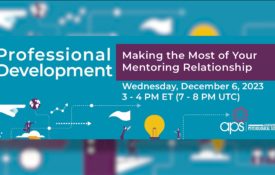-
What Most American Schools Do Wrong
Which country has the best education system? Since 2000, every three years, 15-year-olds in dozens of countries have taken the Program for International Student Assessment — a standardized test of math, reading and science skills. On the inaugural test, which focused on reading, the top country came as a big surprise: tiny Finland. Finnish students claimed victory again in 2003 (when the focus was on math) and 2006 (when it was on science), all while spending about the same time on homework per week as the typical teenager in Shanghai does in a single day. Just over a decade later, Europe had a new champion.
-

Guilty as Charged: How We Contribute to Polarizing Content on Social Media
Podcast: Steven Rathje (New York University) and APS’s Özge G. Fischer-Baum explore the implications for societal change, in-group and out-group behavior, and emotional choices on internet usage.
-

A Tribute to APS Fellows Lost in 2023
The Observer honors the APS Fellows who passed away over the past year and left an indelible mark on scientific psychology. Their groundbreaking studies and theories have advanced fields ranging from clinical psychology to neuroscience.
-

Professional Development Workshop: The Keys to a Successful Mentoring Relationship
What’s the best way to establish a productive mentoring relationship? Learn how to establish healthy mentoring relationships with crucial boundaries and outcomes from both mentee and mentor perspectives.
-

Artificial Intelligence Systems Excel at Imitation, but Not Innovation
While children and adults alike can solve problems by finding novel uses for everyday objects, AI systems often lack the ability to view tools in a new way, researchers explain in this study.
-
The Pandemic Disrupted Adolescent Brain Development
Before COVID, American teenagers’ psychological health was already in decline. The pandemic, with its sudden lockdowns, school closures and other jolts to normal life, made that downward slope steeper. The ensuing mental health crisis has given researchers a rare opportunity to gauge how an extraordinary event such as a public health catastrophe can physically affect the brains of teenagers. Preliminary results for some of these studies are starting to be reported—and they are sobering.

